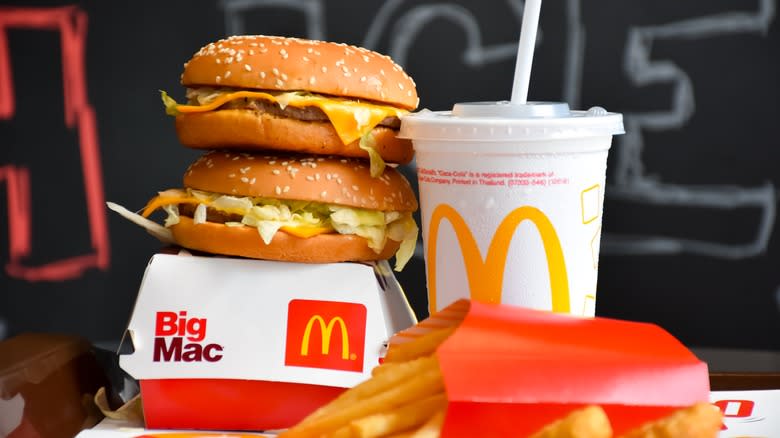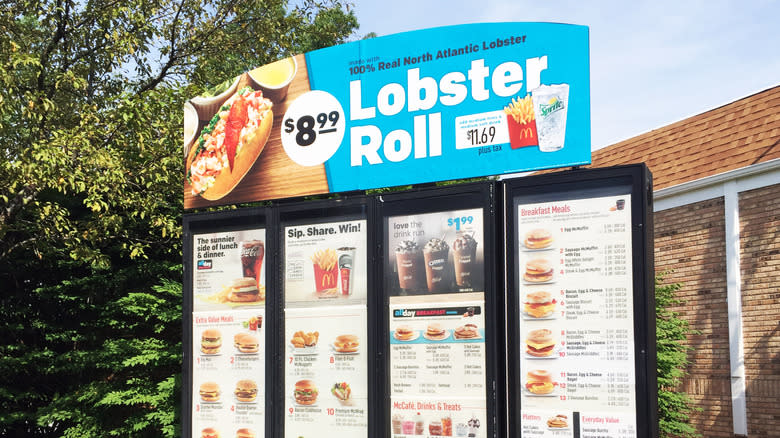Here's Why McDonald's Is Not A Fan Of Special Regional Menu Items

- Oops!Something went wrong.Please try again later.
Though McDonald's menus are usually fairly standardized, sometimes you'll see random regional items on their menus. This could be something like the lobster roll the company still occasionally sells in New England, the ramen you could get at McDonald's Hawaii locations, or the biscuits and gravy that pop up at Southern locations. Occasionally, these items leave their regions and become huge national hits -- the Big Mac started at a Pittsburgh franchise, for instance -- but sometimes, they stay specific to their location of origin and prove just popular enough that the company can't get rid of them. And apparently, the corporate office isn't happy about it when this happens.
Chef Mike Haracz is a TikTok user and former McDonald's corporate chef with a history of posting explainers about the nature of McDonald's business practices and other backstage secrets behind the franchise. Recently, he took on the question of why McDonald's shies away from regional specialties. In short, it messes with what has historically made the McDonald's brand so successful -- reliable uniformity and affordability.
Read more: The Ultimate American Fast Food Restaurants Ranked
McDonald's Is All About Dependability

Ray Kroc may get credited with buying out and then spitefully ruining the original McDonald brothers' remaining business, but it's impossible to deny the impact of his vision. McDonald's became a wildly successful brand -- one of the most in the world -- because of the decisions he made as its head. Though the original few locations under the McDonald brothers focused on consistency and speed after they converted their original location from a BBQ restaurant, it was Kroc who really put the focus on every McDonald's experience being the same. "The same training, the same pieces of equipment, the same menu boards," stressed Mike Haracz in his TikTok video.
Kroc's legacy endures in the way that McDonald's is so particular about the little things. It only uses one variety of potato for its french fries, its ketchup is proprietary, and it even has a special process for delivering soda through its fountains. (It's not your imagination -- soda from McDonald's actually does taste better.) The problem with regional McDonald's items is that they mess with this pattern of consistency and also hurt McDonald's bottom line. It becomes a headache for the company -- one that's hard to justify.
Regional Specialties Make Things More Difficult For The Company

When products or processes are streamlined, companies benefit from the faster supply system's efficiency. As Mike Haracz points out, this standardization allows McDonald's to buy ingredients in bulk because the needs of each store are the same and systems are in place to handle the volume, which in turn keeps prices down. Though McDonald's prices may be up in recent years, it's still one of the more affordable options for dining out. Regional specialty items, though, throw a wrench into these works.
In addition to needing to buy them in smaller, more expensive batches (thus decreasing the profit margin to the company), it's also harder for the company to set up local, consistent supply systems that ensure the brand's reputation. The company doesn't have the national supplier sources whose consistent level of quality can be assured, and it might have to use multiple regional suppliers for the same product -- meaning the end product might taste different depending on which McDonald's customers choose to visit.
Ultimately, everything McDonald's does is about delivering the same experience no matter which location you walk into. That's the goal, anyway, and regional specialty items make that harder.
Read the original article on Daily Meal.

